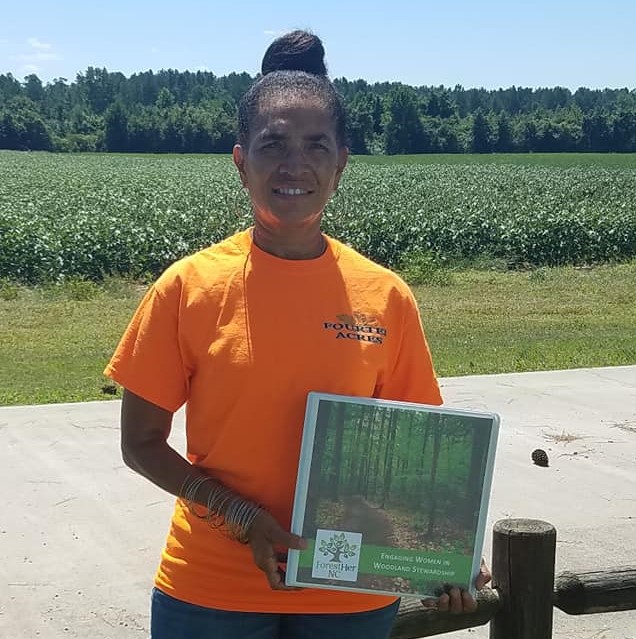By Edna Williams
When I married my husband Tyrone 40 years ago, I also married into life on the farm that had been in his family for generations. Although we were both pursuing careers outside of farming, the land was—and always had been—calling me. Even during my years teaching biology and chemistry, and later as a school principal, I dreamt of working in my own garden, nurturing a patch of land in much the same way I did my family and my students. In recent years, I have been blessed with many opportunities to nourish and grow my “garden.”
Realizing the challenges and opportunities for sustaining the land for ourselves and other Black families, Tyrone and I have been determined to keep the farm in and for our family. We reached out and became active partners with so many wonderful people and organizations, including the Sustainable Forestry and African American Land Retention Network (SFLR), the American Forest Foundation (AFF), the North Carolina Forest Service (NCFS), and the Natural Resources Conservation Service (NRCS). With their assistance, we now maintain and manage the 45 acres of our farm, Fourtee Acres (established in 1994 with the birth of our youngest son), as well as the remaining 150 acres of land owned by extended members of our family to make up the 195 acres called the Williams Family Farm.
Today, Fourtee Acres comprises thriving timber stands and gardens, tenant farming, and other activities that support our family, neighbors, and our community. For example, my passion for botany has led me to experiment with and grow a bounty of produce, including niche vegetables such as bok choy, kohlrabi, mizuna, Tuscan kale, daikon radish, and great white tomatoes. Through this, we can enrich the lives of ourselves and others through exposure to nutritious food outside of the traditional diet of many families…and I always include a recipe for the hesitant!
Nourishment also means engaging with others. Joining ForestHer NC has helped me to become more appreciative of the traditions of inherited lands and the challenges faced by other families (especially women) in retaining their land. This collectively and similarly allows me to share what I have learned with other women. Tyrone and I are also involved with the Black Century Landowners Recognition Program (BCLORP) and the Whitaker Small Farm Group, Inc. (WSFG), working with others on making informed decisions about managing and sustaining their own family farms.
Throughout the year, I conduct workshops with children. Challenged by their circumstances, many of these children may not go to college or get the “best” jobs. What I can offer them is my experience on how they can overcome these challenges by making a good life from the land. It is also my hope that these children learn, as did my own children, that the land provides so much more than income. Beyond nourishing the body, it nourishes the soul through open, serene space for oneself and for sharing with others.
Although we named our farm Fourtee Acres as a play on the names of my husband and our three sons, Trevelyn, Tremaine, and Tyron, it is also a reference to the proverbial “forty acres and a mule.” While we cannot forget our ancestors’ struggles against the backdrop of this failed promise, we must reassess the traditional association of Black farming with slavery and sharecropping. We have the means to maintain and sustain the land differently than our ancestors, encouraging variety, creativity, and diversity. We cannot be afraid to make mistakes because that gives us an opportunity to learn. As obtained from a collaborative resource, we can “fail forward,” taking what we know and making it better by embracing and nourishing practices that create and sustain a thriving life on the land for our children, our families, our community, and all of those that we serve.


